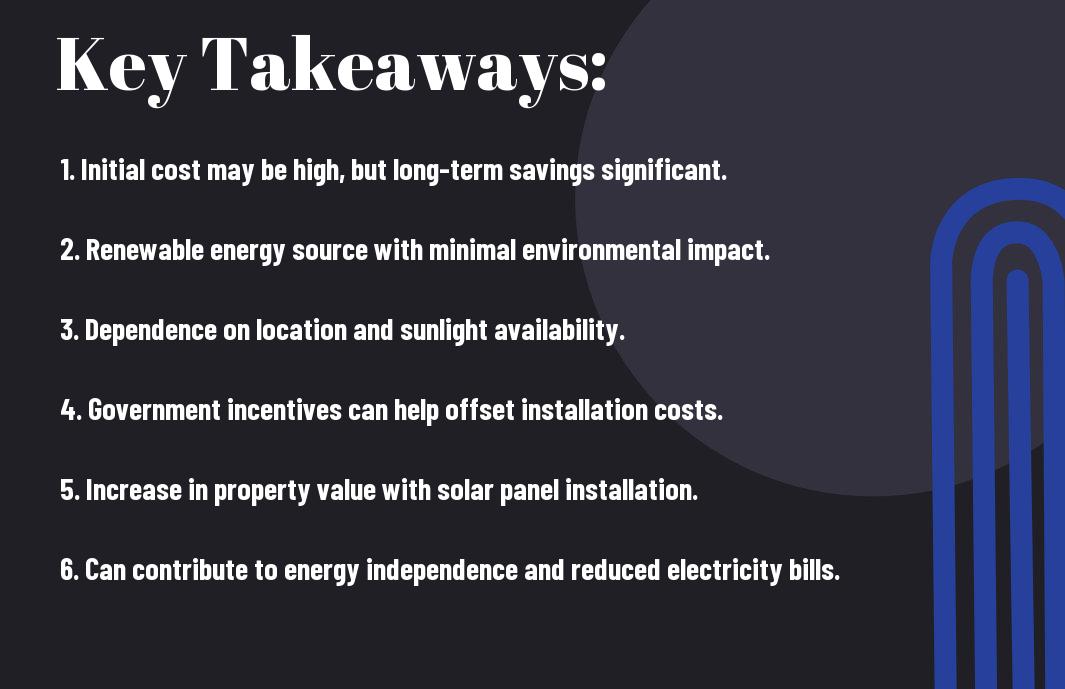Most individuals ponder the question, “Is solar power worth it?” when considering alternative energy sources. Switching to solar energy can have a positive impact not only on the environment but also on your finances in the long run. This informative article will explore the benefits of solar power, including cost savings, energy independence, and environmental sustainability. By the end, you will have a deeper understanding of whether investing in solar power is the right choice for you.
Key Takeaways:
- Cost Savings: Solar power can lead to significant cost savings over time as it reduces monthly electricity bills and can potentially generate income through selling excess energy back to the grid.
- Environmental Benefits: Using solar power helps reduce carbon emissions and dependence on fossil fuels, making it a more sustainable and eco-friendly energy option.
- Long-Term Investment: While the upfront costs of installing solar panels can be high, it is considered a long-term investment that can increase the value of a property and provide a reliable source of energy for years to come.

The Benefits of Solar Power
Environmental Advantages
While considering whether solar power is worth it, you cannot overlook the environmental benefits it offers. The switch to solar power helps combat greenhouse gas emissions, reducing your carbon footprint and overall impact on the environment. Solar energy is a renewable and sustainable energy source, unlike fossil fuels which deplete natural resources and contribute to climate change.
Cost-Effective Energy Solution
The financial aspect of solar power is another crucial factor to consider. By installing solar panels, you can significantly reduce your electricity bills over time, as you rely less on traditional utility providers. Additionally, with various government incentives and rebate programs available, the initial investment in solar power can often be offset, making it a cost-effective long-term energy solution for your home.
A transition to solar power is not just a smart financial move but also a step towards a more sustainable future. By generating your electricity through solar panels, you are less susceptible to fluctuations in energy prices and contribute to a cleaner energy landscape for future generations.
The Drawbacks of Solar Power
One The Pros and Cons of Solar Panels: Are They Worth It? of solar power is its high upfront costs. With the initial investment required for purchasing and installing solar panels, it can take several years to recoup these costs through energy savings. Additionally, not everyone has the financial means to afford these upfront expenses, making solar power less accessible to some individuals.
High Upfront Costs
With the installation of a solar power system costing thousands of dollars, it may not be a feasible option for everyone. While there are government incentives and financing options available to help alleviate some of these costs, the initial investment remains a significant drawback for many potential solar users.
Intermittent energy source<
Intermittent
Another drawback of solar power is that it is an intermittent energy source. This means that solar panels can only generate electricity when the sun is shining, making energy production inconsistent, especially during cloudy days or at night. As a result, you may need to rely on alternative energy sources or energy storage solutions to ensure a continuous power supply for your needs.
Power
Power storage solutions such as batteries can help address the issue of intermittent energy production by storing excess energy generated during sunny periods for use when sunlight is not available. However, these storage systems come with additional costs and maintenance requirements, adding to the overall expense of a solar power setup.
The Science Behind Solar Power
How Solar Panels Work
Keep in mind that solar panels work by harnessing sunlight and converting it into electricity through photovoltaic cells. These cells are typically made of silicon, a semiconductor material that releases electrons when struck by photons from the sun. As these electrons flow through the cells, they generate direct current (DC) electricity. An inverter then converts this DC electricity into alternating current (AC) electricity that can power your home’s appliances and electronics.
Efficiency Rates and Technological Advancements
The efficiency of solar panels refers to how well they can convert sunlight into electricity. Over the years, there have been significant technological advancements in solar panel efficiency, with newer models boasting higher rates than ever before. The efficiency of solar panels is influenced by factors such as the quality of materials used, the angle and orientation of the panels, and the presence of any shading that may reduce sunlight exposure.
The constant evolution of solar panel technology means that newer models are becoming increasingly efficient at capturing and converting sunlight into usable electricity. This results in higher energy output from the same surface area of solar panels, making them more cost-effective and attractive for homeowners looking to adopt solar power.
Real-World Applications of Solar Power
To explore the real-world applications of solar power, you should consider the practicality and benefits of solar panels. Are Solar Panels Worth It? (2024 Guide) can provide valuable insights into the long-term savings and environmental impact of solar energy. Residential, commercial, and industrial sectors have all embraced solar power for various reasons.
Residential Use
Solar power for residential use has gained popularity due to its potential cost savings, reduced reliance on traditional energy sources, and environmental advantages. Installing solar panels on your roof can significantly lower your electricity bills over time and increase your home’s value. Additionally, many governments offer incentives and tax benefits to homeowners who choose to invest in solar energy.
Commercial and Industrial Use
Commercial and industrial sectors have also benefited from harnessing solar power. Many businesses and factories have integrated solar panels into their operations to reduce operating costs and demonstrate corporate social responsibility. By utilizing solar energy, companies can not only save money on electricity bills but also enhance their reputation as environmentally conscious entities.
It is becoming increasingly common to see large corporations, such as tech companies and retailers, investing in solar power to meet sustainability goals and contribute to a greener future. Solar energy is not only a practical solution but also a strategic investment for businesses looking to secure long-term energy stability and mitigate the impacts of climate change.
Government Incentives and Policies
Not only is solar power a sustainable and effective source of renewable energy, but government incentives and policies can also make it a financially attractive option for homeowners looking to make the switch. From tax credits to net metering laws, these initiatives play a significant role in making solar power a worthwhile investment.
Tax Credits and Rebates
An vital financial incentive for installing solar panels is the federal Investment Tax Credit (ITC), which allows you to deduct a percentage of the cost of installing a solar energy system from your federal taxes. Aside from the federal level, many states offer additional tax credits and rebates that further reduce the upfront costs of going solar. These incentives can make a significant difference in the overall affordability of solar power for your home.
Net Metering Laws and Regulations
Laws regarding net metering allow you to sell excess electricity generated by your solar panels back to the grid, effectively spinning your electricity meter backward and giving you credits on your utility bill. This means that you can offset the cost of electricity drawn from the grid during times when your solar panels are not producing enough energy, making it a practical and cost-effective way to go solar.
A crucial aspect to consider when evaluating net metering regulations is the specific policies in your state regarding credit rates, capacity limits, and billing arrangements. Understanding these regulations can help you maximize the financial benefits of solar power and ensure that you make the most of your investment in renewable energy.

Debunking Common Myths About Solar Power
Addressing Energy Storage Concerns
On your journey to understanding the benefits of solar power, you might have come across concerns about energy storage. Some believe that solar power is not reliable because it is dependent on the sun shining. However, advancements in technology have greatly improved energy storage options for solar systems. Batteries can now store excess energy generated during the day for use during the night or on cloudy days. This means that you can still have access to electricity even when the sun isn’t shining brightly.
Disproving the “It’s Too Expensive” Myth
Myths about the high costs of solar power installation often deter people from considering this sustainable energy source. However, the reality is that the initial investment in solar panels can be offset by the significant savings you will make on your electricity bills over time. Additionally, there are various financing options and government incentives available that can make solar power more affordable than you think. So, don’t let the upfront costs scare you away from reaping the long-term benefits of solar energy.
Another important point to consider when debunking the “It’s Too Expensive” myth is the overall increase in home value that solar panels can bring. Studies have shown that homes with solar power systems tend to sell faster and at a higher price than those without. So, investing in solar power is not just about saving money on electricity bills but also about increasing the value of your property in the long run.

Conclusion
To wrap up, the decision of whether solar power is worth it for you ultimately depends on your individual circumstances and priorities. Consider factors such as your location, energy usage, budget, and environmental values. While there are upfront costs associated with installing solar panels, the long-term savings on energy bills and potential environmental benefits can make solar power a worthwhile investment. It’s crucial to carefully research and weigh the pros and cons before making a decision that aligns with your specific needs and goals.
FAQ
Q: Is solar power worth it for my home?
A: Yes, solar power can be worth it for your home in the long run. While there is an initial investment cost, it can lead to significant savings on your electricity bills over time.
Q: How long does it take to break even on the cost of solar panels?
A: The time it takes to break even on the cost of solar panels can vary depending on factors such as your electricity usage, the cost of installation, available incentives, and the amount of sunlight your area receives. On average, it can take anywhere from 5 to 15 years to break even.
Q: Are there any incentives for installing solar panels?
A: Yes, there are various incentives available for installing solar panels, such as federal tax credits, state rebates, and net metering programs. These incentives can help offset the initial cost of installation and make solar power more affordable.
Q: How do I know if my home is suitable for solar panels?
A: To determine if your home is suitable for solar panels, factors such as the amount of sunlight your roof receives, the angle and orientation of your roof, and any shading from trees or buildings should be considered. A solar provider can conduct a site assessment to help determine the feasibility of solar power for your home.
Q: Can solar power increase the value of my home?
A: Yes, solar power can potentially increase the value of your home. Studies have shown that homes with solar panels tend to sell faster and at a higher price than those without, as they are seen as more energy-efficient and environmentally friendly.
